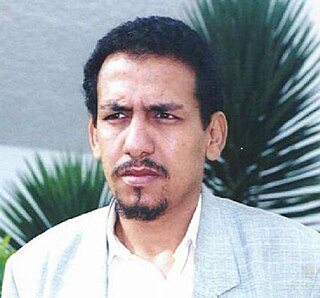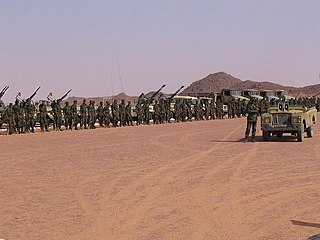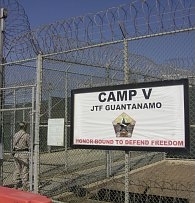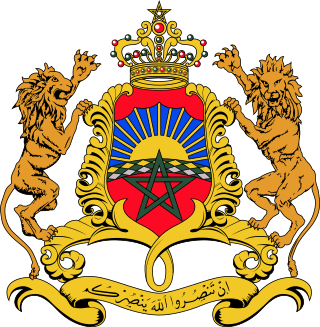
Western Sahara is a disputed territory in North-western Africa. It has a surface area of 272,000 square kilometres (105,000 sq mi). Approximately 30% of the territory is controlled by the Sahrawi Arab Democratic Republic (SADR); the remaining 70% is occupied and administered by neighboring Morocco. It is the most sparsely populated territory in Africa and the second most sparsely populated territory in the world, mainly consisting of desert flatlands. The population is estimated at 618,600. Nearly 40% of that population lives in Morocco-controlled Laayoune, the largest city of Western Sahara.

The First Barbary War (1801–1805), also known as the Tripolitan War and the Barbary Coast War, was a conflict during the 1801–1815 Barbary Wars, in which the United States fought against Ottoman Tripolitania. Tripolitania had declared war against the United States over disputes regarding tributary payments in exchange for a cessation of Tripolitanian commerce raiding at sea. United States President Thomas Jefferson refused to pay this tribute. The First Barbary War was the first major American war fought outside the New World, and in the Arab world, besides the smaller American–Algerian War (1785–1795).

Mohamed Abdelaziz was the 3rd Secretary General of the Polisario Front, from 1976, and the 1st President of the Sahrawi Arab Democratic Republic from 1982, until his death in 2016.

The Perdicaris affair, also known as the Perdicaris incident, refers to the kidnapping of Greek-American Ion Hanford Perdicaris (1840–1925) and his stepson, Cromwell Varley, a British subject, by Ahmed al-Raisuni and his bandits on 18 May 1904 in Tangier, Morocco. Raisuni, leader of several hill tribes, demanded a ransom of $70,000, safe conduct, and control of two of Morocco's wealthiest districts from the Sultan of Morocco Abd al-Aziz. During lengthy negotiations, he increased his demands to control of six districts. The historical importance of the affair lay not in the kidnapping itself but in the concentration of naval power in Tangier and what it meant for the politics of gunboat diplomacy.
Tazmamart was a secret prison in the Atlas Mountains of Morocco holding political prisoners. The prison became a symbol of oppression in the political history of contemporary Morocco. It is located near the city of Er-Rich, between Errachida and Midelt. It was managed by commandant Feddoul and Hamidou Laanigri, both Royal Moroccan Gendarmerie officials.

Ali Salem Tamek is a Sahrawi independence activist and trade unionist.
The Independence Intifada or the Second Sahrawi Intifada and also May Intifada is a Sahrawi activist term for a series of disturbances, demonstrations and riots that broke out in May 2005 in the Moroccan-controlled parts of Western Sahara and south of Morocco. This event has also been called The El-Aaiun Intifada by the same sources.

The Government of Morocco sees Western Sahara as its Southern Provinces. The Moroccan government considers the Polisario Front as a separatist movement given the alleged Moroccan origins of some of its leaders.

The Western Sahara conflict is an ongoing conflict between the Sahrawi Arab Democratic Republic/Polisario Front and the Kingdom of Morocco. The conflict originated from an insurgency by the Polisario Front against Spanish colonial forces from 1973 to 1975 and the subsequent Western Sahara War against Morocco between 1975 and 1991. Today the conflict is dominated by unarmed civil campaigns of the Polisario Front and their self-proclaimed SADR state to gain fully recognized independence for Western Sahara.

The Guantanamo Bay detention camp, also known as GTMO, GITMO, or just Guantanamo Bay, is a United States military prison within Naval Station Guantanamo Bay (NSGB), on the coast of Guantánamo Bay, Cuba. It was established in January 2002 by U.S. President George W. Bush to hold terrorism suspects and "illegal enemy combatants" during the Global War on Terrorism following the attacks of September 11, 2001. As of December 2024, at least 780 persons from 48 countries have been detained at the camp since its creation, of whom 743 had been transferred elsewhere, 9 died in custody, and 27 remain; only 16 detainees have ever been charged by the U.S. with criminal offenses.

Morocco became a highly repressive country under the absolute monarchy of King Hassan II, and continues to be considered repressive under the reign of King Mohammed VI, though the latter has instituted some reforms. Dozens of journalists, artists, and ordinary citizens are regularly sentenced to lengthy prison sentences for exercising basic rights enjoyed elsewhere in the world, such as freedom of the press, protesting the government, or criticizing government officials. Morocco heavily restricts basic human rights, such as freedom of speech, the right to assembly, and the right to criticize officials. Moroccans also feel the pressures of inflation within the country, such as the lack of basic services like healthcare, clean water, and the difficulty of parents to access quality education for their children. While there have been a handful of reforms that have been generally welcomed internationally, most Moroccans feel this is insufficient, and continue to be unhappy with the trajectory of the country under the policies of King Mohammed VI, despite his transition of the government to an ostensible constitutional monarchy. Under his father, King Hassan II, Morocco had one of the worst human rights records in Africa and the world, especially during the time period known as the "Years Of Lead", which lasted from the early 1960s until the late 1980s; it was a period in the country's history that was known for the brutal repression of political dissent and opposition, that involved wide-scale arrests, arbitrary detention, lengthy imprisonment, and even killings of political opponents. Currently, Morocco continues to face some of these issues, as well as other human rights problems, such as poor prison conditions, the mistreatment of women and the LGBT community, and the widespread use of torture by police. Despite the considerable improvements made in the last several years under the leadership of King Mohammed VI, who has rolled back some of his father's harshest decrees, repression of political dissidence, and torture of citizens by officials, is still commonplace in Morocco today.

The Sahrawi Association of Victims of Grave Violations of Human Rights Committed by the Moroccan State, or ASVDH, is a Sahrawi human rights organization in the Moroccan-occupied areas of Western Sahara.

Brahim Dahane is a Sahrawi human rights activist and president of the Sahrawi Association of Victims of Grave Human Rights Violations Committed by the Moroccan State.

Numerous internment camps and concentration camps were located in France before, during and after World War II. Beside the camps created during World War I to intern German, Austrian and Ottoman civilian prisoners, the Third Republic (1871–1940) opened various internment camps for the Spanish refugees fleeing the Spanish Civil War (1936–1939). Following the prohibition of the French Communist Party (PCF) by the government of Édouard Daladier, they were used to detain communist political prisoners. The Third Republic also interned German anti-Nazis.

The 316th Airlift Division is an inactive United States Air Force organization. Its last assignment was with the United States Air Forces in Europe, assigned to Seventeenth Air Force, being stationed at Ramstein Air Base, Germany. It was inactivated on 1 May 1991.

United Nations Security Council resolution 1598, adopted unanimously on 28 April 2005, after recalling all previous resolutions on the situation in Western Sahara, including resolutions 1495 (2003), 1541 (2004) and 1570 (2004), the Council extended the mandate of the United Nations Mission for the Referendum in Western Sahara (MINURSO) until 31 October 2005.

United Nations Security Council Resolution 1634, adopted unanimously on 28 October 2005, after recalling all previous resolutions on the situation in Western Sahara, including resolutions 1495 (2003), 1541 (2004) and 1598 (2005), the Council extended the mandate of the United Nations Mission for the Referendum in Western Sahara (MINURSO) until 30 April 2006.
The First Battle of Amgala was fought between 27 and 29 January 1976 around the oasis of Amgala, Western Sahara, about 260 kilometres (160 mi) west of the border with Algeria. Units from the Algerian Army were attacked by units from the Royal Moroccan Armed Forces on the night of 27 January. The Algerians withdrew after fighting for 36 hours. However, the retaliation came fairly soon, between 13 and 15 February 1976 Polisario units defeated Moroccan troops in the second Battle of Amgala.














